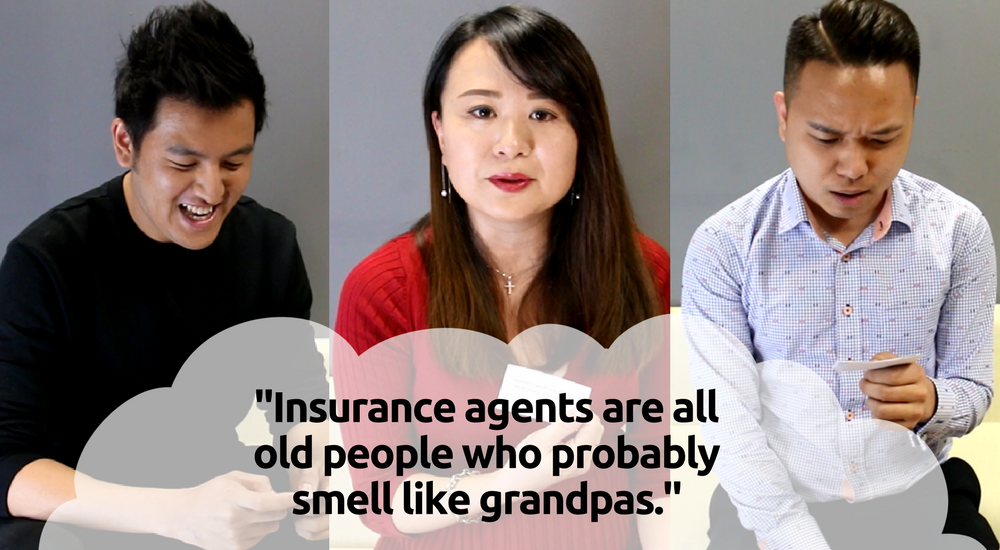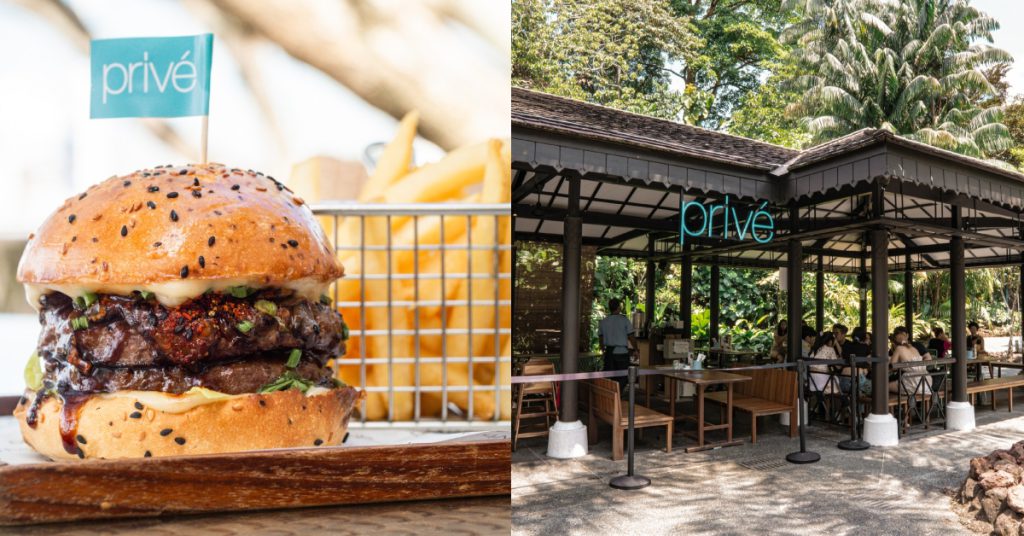“If you receive a call from a friend who hasn’t talked to you in forever, sure confirm it’s either insurance or MLM.”
This was the statement that got us thinking. At its core, we cannot deny that insurance does have its uses, and it’s hardly mumbo-jumbo. Why then do so many view it through very negative lenses?
To test this, we asked around our office to see what the millennials thought of insurance agents, and what we got back was hardly flattering.
There were some common themes running throughout, so we’ve gathered 8 that seemed to be the most pervasive assumptions.
Next, we sought the advice of 3 insurance agents (big thanks to Great Eastern Life who kindly loaned us 3 agents for this article!) to debunk some of the myths surrounding them.
To make sure that we’re getting reliable facts, all 3 of them—Rachel, Jimmy, and Sheng Yi—have been in the industry for around a decade.

In the style of Celebrities Read Mean Tweets, they were given the comments and had to react to them, on the spot!

Comment 1: “Being an insurance agent is your last resort. If you’re not good at anything and can’t get a job anywhere else, then be an insurance agent lor.”

Rachel: Honestly, there are actually a lot of people who fail the insurance exam! There are 2 papers in the exam before becoming an insurance agent, you need basic finance knowledge and you have to be very professional. It’s not an easy test that anyone can just pass with flying colours.
Sheng Yi: I’m a Master’s graduate, I have no problem finding a job somewhere else!
We were surprised to learn that Sheng Yi worked part-time as an insurance agent while he was studying.
After he completed his Master’s in UK, he decided to go full-time into the industry instead of getting a job in a bank or in financial investment. All simply because he enjoyed the job.
In short, insurance wasn’t a life they were forced into, it was a career that they chose.
Comment 2: “Insurance agents tell you they get to travel, have a big house, big car. Pfft, out of 100 agents, maybe only 2 are actually living the high life.”

The agents did not quickly dismiss this comment because they acknowledged that “easy-ness” is something that is subjective.
Rachel: There is some truth in that. Because not everyone is persistent in what they do. But if you are not persistent in this job, then you are not going to be persistent anywhere else. So you’re not going to find success in anything you do.
They agreed that it will be challenging in the beginning, as with any other job. But to say that only 2 out of 10 people are successful is an exaggeration.
Sheng Yi: You don’t have to be the top 2 out of 100 to live a good life. Maybe you won’t be a millionaire, but you’ll lead a high quality life.
Instead of working from the office everyday from 9 to 6—for example even though work is finished, you still have to stay back—we don’t do that.
For me personally, in my team and company, the way we work is to finish work as soon as possible and then leave to spend time with loved ones or do our own hobbies.
The biggest difference that they highlighted is that the quality and general happiness of their life is what drives them.
Comment 3: “Insurance agents are leeches who waste your money because they get you to buy things you don’t actually need.”

In the past, the industry was less regulated, so there was a risk of having agents who were less educated or professional.
This then slowly formed the misconception that agents are just pushy salesmen who intrusively deceit people to buy an insurance plan.
However in the current industry, insurance agents actually place a high emphasis on the necessity of proper training and professionalism.
So much so that insurance companies are willing to spend what is necessary to invest in agent development. We were told that just a few years ago Great Eastern once spent RM20 million to renovate a whole floor into a dedicated training facility, the Centre For Excellence (CFE).
The training facility’s goal is to ensure that the agents can provide quality and professional sales advisory in their businesses that focus on the needs of clients first.
At the end of the day, if the agents are performing at their best, then the clients win out.
Rachel: I’m not sure about the other insurance companies, but for Great Eastern Life, there is a minimum requirement of 30 hours of training a year. That is a basic condition.
She also said that at various stages of your career, there are different types of training provided. So there is no shortage of learning and self-improvement.
Comment 4: “Aren’t you guys just telemarketers who sit around and cold call every day?”

Young and fresh agents do sometimes have to cold-call and even do canvassing, because they lack the network and contacts.
Jimmy: It also depends on the age of the agents. If you come in very young, with no network except your “natural” network (i.e. your friends and family), then you might have to start from scratch.
For those who’ve worked before, they already have a network to reach out to, and they know how to communicate with people.
But for agents who’ve been in the field for a while, all their business usually comes through referrals. Once their clients have built trust with the agents, they’re more likely to tell their own friends and family about the policies and encourage them to buy it.
Young agents aren’t just thrown to the wolves though. Their seniors are usually on hand to give them a boost.
Sheng Yi: The seniors do guide us from the start with a lot of roleplaying, or we meet clients with our seniors, where they demo or we try it out in front of them.
Afterwards, they give us their feedback on what we did well and what we need to improve on. It’s a really supportive industry.
Comment 5: “Insurance agents are all old people who probably smell like grandpas.”

The agents we met were in their twenties to thirties and they were adamant that their teams are young, or at the very least, young at heart.
Jimmy: Maybe in the past, but now we’re all about building a young and energetic team. We attract a lot of youngsters. We do internships and roadshows and recruit fresh grads, and they all seem to really enjoy working with us.
Sheng Yi: My team, our average age is about 25. Of course, there are older agents, but they don’t behave that way. These seniors, they’re around 40 to 50-years-old, but they make use of technology to reach their clients. You won’t grow “old” on this job.
Rachel: LOOK at me! I’m young ok! I wear makeup and look good. People even mistake me for a Gen Y sometimes!
Comment 6: “The insurance agents’ career is for lazy people who have no desire for true career progression.”

Yes, they did all mention that it is very possible to be earning at least 5 figures a month, provided you do the work first.
It all boils down to a very simple equation: Effort = Reward. It was clear that effort really does pay off in the their line of work.
Employees in other industries might not feel that they’re directly or immediately rewarded for hard work, but in insurance, that’s not the case.
All three we spoke to are highly motivated and clearly are passionate about what they do.
They all agreed that it’s great to be their own bosses because other than the flexible nature of the job, they also get to achieve career progression.
Case in point, Jimmy, Rachel, and Sheng Yi have advanced past the stage of being salespeople. At their level of experience and knowledge, they’ve become leaders in their own right, running their own teams and companies—while still only being in their 30s.
Rachel: It’s not easy, but after the first few years, it’s so flexible that I love it. I can’t go back to a desk job.
They did want us to clarify that business can be lucrative but it does requires discipline and a serious business mind to be successful.
Comment 7: “Insurance agents are basically like MLM sellers, that’s why I avoid them.”

For this statement, the agents weren’t too surprised that such perceptions abound.
Sheng Yi: MLM sells plans and products, we sell services. When you look at how we work, it does look the same from the outside. I mean, for both, you invite someone out to a coffeeshop and put a piece of paper on the table.
But there is a clear difference. They further explained:
- Insurance is regulated by Bank Negara. This means that agents have to be professional.
- There are professional exams before you can legally sell insurance.
- Insurance companies are licensed financial institutions, like banks.
If the agent is found to have pushed a client into purchasing an unnecessary policy, the agent’s license could possibly be suspended or terminated.
Comment 8: “When you’re actually in need, insurance agents will find loopholes in your plan so you can’t even get any money.”

Aside from this comment making the agents upset, they clarified that everything is laid out in black and white in the terms and conditions.
Also, it’s the agent’s job and responsibility to ensure that their clients understand the policies, so they have to go through each point with the clients.
Rachel: The best way, is when you receive your policy, go through it with your insurance agent. When we deliver the policy, it’s our job to go through each point with them. They have to understand what they buy.
Insurance agents don’t benefit from not paying out—if anything it actually hurts their business.
They do have a vested interest to fight hard to make sure the claims are paid out and for more coverage.
When they succeed, their reputation for being someone who is able to get the claims and other admin stuff processed will eventually attract business to them.
With all said and done, we promised them that we’d help to tell people to stop dissing their profession with negative presumptions, so if your curiosity has been piqued about their jobs and what they actually do, you can find out more here.
To the three agents, we’re sorry if this got you down.

Hope this exercise didn’t really impact you negatively.

Erm… no hard feelings right?













